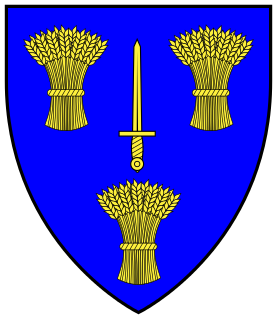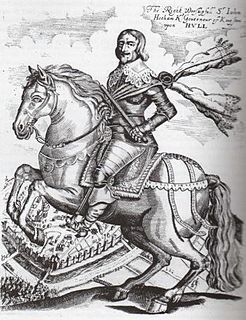This is a list of people elected Fellow of the Royal Society in 1934.
This is a list of people elected Fellow of the Royal Society in 1934.

Sir William Wallace was a Scottish knight who became one of the main leaders during the First War of Scottish Independence.

Her Majesty's Attorney General for England and Wales is one of the law officers of the Crown. The attorney general serves as the principal legal adviser to the Crown and the Government in England and Wales. The attorney general maintains the Attorney General's Office and currently attends Cabinet. Unlike in other countries utilizing the common law legal system, the Attorney General does not administer the judicial system; that function is carried out by the Secretary of State for Justice. The office is also concurrently held with that of Advocate General for Northern Ireland.
The Lord High Chancellor of Ireland was the highest judicial office in Ireland until the establishment of the Irish Free State in 1922. From 1721 to 1801, it was also the highest political office of the Irish Parliament: the Chancellor was Speaker of the Irish House of Lords. The Lord Chancellor was also Lord Keeper of the Great Seal of Ireland. In all three respects, the office mirrored the Lord High Chancellor of Great Britain.

The Royal Society of Edinburgh is Scotland's national academy of science and letters. It is a registered charity that operates on a wholly independent and nonpartisan basis and provides public benefit throughout Scotland. It was established in 1783. As of 2021, there are around 1,700 Fellows.

Her Majesty's Solicitor General for England and Wales, known informally as the Solicitor General, is one of the law officers of the Crown in the government of the United Kingdom. They are the deputy of the Attorney General, whose duty is to advise the Crown and Cabinet on the law. They can exercise the powers of the Attorney General in the Attorney General's absence. Despite the title, the position is usually held by a barrister as opposed to a solicitor.
The Comptroller of the Household is an ancient position in the British royal household, nominally the second-ranking member of the Lord Steward's department after the Treasurer of the Household. The Comptroller was an ex officio member of the Board of Green Cloth, until that body was abolished in the reform of the local government licensing in 2004. In recent times, a senior government whip has invariably occupied the office. On state occasions the Comptroller carries a white staff of office, as often seen in portraits.
The Chemical Society was a scientific society formed in 1841 by 77 scientists as a result of increased interest in scientific matters. Chemist Robert Warington was the driving force behind its creation.

Clan Douglas is an ancient clan or noble house from the Scottish Lowlands.

This is a list of Sheriffs of Cheshire.
The Chief Baron of the Exchequer was the first "baron" of the English Exchequer of Pleas. "In the absence of both the Treasurer of the Exchequer or First Lord of the Treasury, and the Chancellor of the Exchequer, it was he who presided in the equity court and answered the bar i.e. spoke for the court." Practically speaking, he held the most important office of the Exchequer of Pleas.

The Sheriff is the oldest secular office under the Crown. Formerly the Sheriff was the principal law enforcement officer in the county but over the centuries most of the responsibilities associated with the post have been transferred elsewhere or are now defunct, so that its functions are now largely ceremonial.
The High Sheriff of Devon is the Queen's representative for the County of Devon, a territory known as his/her bailiwick. Selected from three nominated people, they hold the office for one year. They have judicial, ceremonial and administrative functions and execute High Court Writs. The title was historically "Sheriff of Devon", but changed in 1974 to "High Sheriff of Devon".
This is a list of High Sheriffs of Lincolnshire.

The High Sheriff of Lancashire is an ancient officer, now largely ceremonial, granted to Lancashire, a county in North West England. High Shrievalties are the oldest secular titles under the Crown, in England and Wales. The High Sheriff of Lancashire is the representative of the monarch in the county, and is the "Keeper of The Queen's Peace" in the county, executing judgements of the High Court through an Under Sheriff.

The Royal Naval College, Greenwich, was a Royal Navy training establishment between 1873 and 1998, providing courses for naval officers. It was the home of the Royal Navy's staff college, which provided advanced training for officers. The equivalent in the British Army was the Staff College, Camberley, and the equivalent in the Royal Air Force was the RAF Staff College, Bracknell.
The 1861 Birthday Honours were appointments by Queen Victoria to various orders and honours to reward and highlight good works by citizens of the British Empire. The appointments were made to celebrate the official birthday of the Queen, and were published in The London Gazette on 28 June 1861.